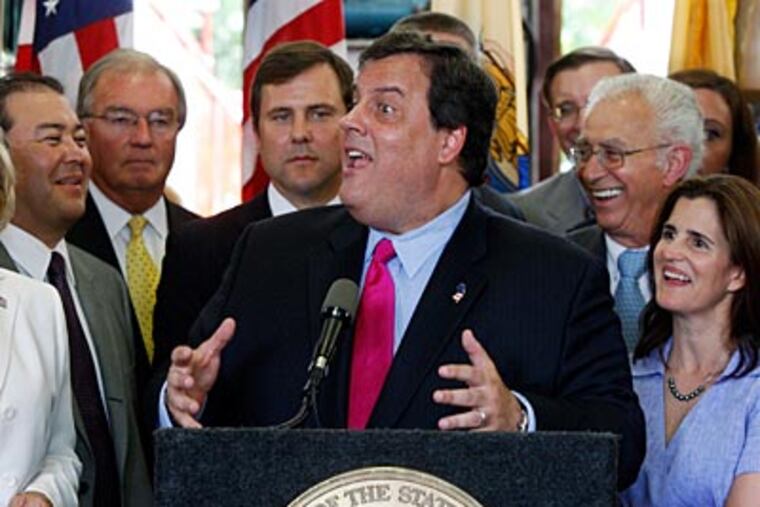Editorial: The Jersey steamroller
Give New Jersey Gov. Christopher J. Christie credit - he got the state budget he wanted, closing an $11 billion deficit without a statewide tax increase.

Give New Jersey Gov. Christopher J. Christie credit - he got the state budget he wanted, closing an $11 billion deficit without a statewide tax increase.
That's a stunning turnaround in a state with chronically high taxes and runaway spending. Republican Christie's my-way-or-the-highway approach steamrolled Democrats in the Legislature, who offered few good alternatives to Christie's cuts.
Today, the Legislature will begin to address the other half of Christie's plan - a proposed constitutional amendment limiting annual property-tax increases to 2.5 percent. Without it, the governor knows, towns and school districts whose aid he cut significantly will be tempted to raise local taxes far higher.
While most taxpayers are rooting for Christie, it must be acknowledged that his $29.4 billion budget pushes some major problems down the road.
This is a budget balanced on the backs of lower-income residents, and it relies on some onetime gimmicks in the tradition of past governors of both parties.
For example, Christie "saved" $3.1 billion simply by not contributing what the state owes to the public employees' pension funds. New Jersey is already facing a crisis of $174 billion in unfunded pension liabilities. That daunting figure assumes that the pension funds are gaining a modest annual return of 3.5 percent on investments. So far this year, the stock market is down more than 5 percent.
Christie has already banned pensions for part-timers and reduced benefits for new hires, and he wants further reforms. But failing to contribute even one dime to the funds isn't part of the solution. One of the five funds could run out of money by 2013.
The governor also chose to cut $848 million in property-tax rebates, which were poor policy.
But Christie vetoed a reasonable proposal by Democrats to reinstitute a tax increase on residents earning more than $1 million per year. Those families will get a tax break this year averaging $40,000, while low-income residents are getting hit with cuts to housing, child care, health care, and more.
The proposal to cap property-tax increases makes more sense than the Democratic alternative, which would limit annual increases to 2.9 percent but contains so many loopholes as to render it ineffective. Democrats would exempt key areas such as pensions and health care that tend to drive up costs.
Christie's plan suffers from a feature that allows voters to override the cap only if a supermajority of 60 percent approve. If a simple majority wants to exceed the cap in its town, the public will should carry the day.
Legislative committees would need to approve a cap by July 7 to get it on the November ballot.
Christie's first budget as governor is harsh medicine. But in a state where the average property-tax bill is nearly $7,300, he is on the right track.